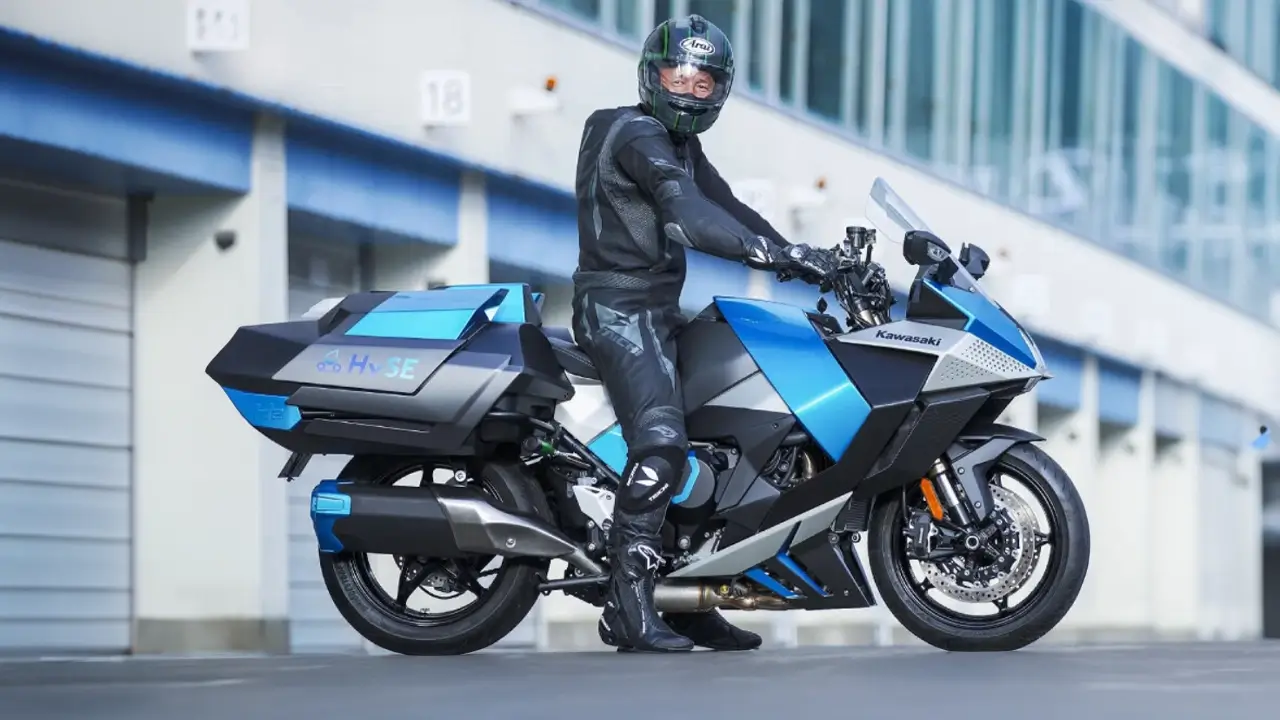Kawasaki has shocked the world by unveiling the first motorcycle that runs on hydrogen. This groundbreaking motorcycle called the H2 HySE, marks a significant step towards sustainable transportation. It was publicly demonstrated for the first time at the Suzuka Circuit in Japan.
Kawasaki Hydrogen Motorcycle: A New Era of Sustainable Riding
Design
The Kawasaki hydrogen motorcycle has a futuristic design with sharp curves, making it stand out from traditional bikes. It features unique luggage case-like tanks behind the rider to store hydrogen fuel. These tanks are essential for the bike’s operation and give it a distinctive look.
The H2 HySE includes advanced technology to handle hydrogen fuel. The bike’s frame has been specially designed to accommodate hydrogen canisters. This design ensures that the hydrogen is safely stored and efficiently used to power the motorcycle.
Engine
The Kawasaki hydrogen motorcycle is powered by a modified 998-cubic-centimeter supercharged four-cylinder engine. This engine, similar to the one used in the Ninja H2, has been adapted to burn hydrogen. The dual-injected gas engine enhances fuel delivery and combustion, making it highly efficient and environmentally friendly.
Performance
Hydrogen fuel offers several benefits, including high energy density and low emissions. When hydrogen burns, the only by-product is water vapor, making it much cleaner than gasoline or diesel. The Kawasaki hydrogen motorcycle also maintains the rumbling and vibrating feel of a traditional gasoline engine, providing a familiar riding experience.
Competition
Kawasaki is not alone in exploring hydrogen technology. Other companies like Toyota are also testing hydrogen engines, though primarily for cars. In the motorcycle industry, Kawasaki is collaborating with Suzuki, Honda, and Yamaha to advance hydrogen fuel technology.
- Audi GT50 Concept: A Loud Reminder of Why Car Enthusiasts Fell in Love With Audi
- Nearly 30% of UK Drivers Believe Car Tax Should Be Based on Mileage — Survey
- Why Planes and Boats Escaped the Luxury Tax But Cars Didn’t
- Australia’s Headlight Confusion: Authorities Warn Drivers After Viral $250 Headlight Rule Goes Wild Online
- 2025 Hyundai Venue Facelift Launched in India – Full Details, Variants, and Price
Challenges
One of the main challenges for hydrogen-powered motorcycles is the lack of infrastructure for hydrogen fuel. Storing and transporting hydrogen is more complex than gasoline, requiring larger tanks to achieve the same range. Despite these challenges, Kawasaki remains committed to developing and perfecting this technology.
Future Prospects
Kawasaki plans to continue research and development to make hydrogen motorcycles commercially available by the early 2030s. The company aims to contribute to carbon-neutral transportation and reduce the environmental impact of motorcycles.
Conclusion
The Kawasaki hydrogen motorcycle represents a significant innovation in sustainable mobility. By harnessing hydrogen fuel, Kawasaki is paving the way for cleaner and more efficient transportation. With continued development and collaboration, the future of hydrogen-powered motorcycles looks promising.

